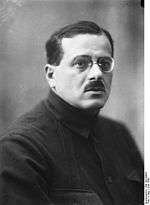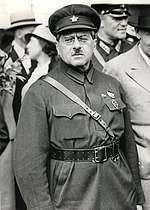Józef Unszlicht
Józef Unszlicht or Iosif Stanislavovich Unshlikht[1] (Russian: Ио́сиф Станисла́вович У́ншлихт; nicknames "Jurowski", "Leon") (1879 - 1937)[2] was a Bolshevik revolutionary activist, one of the founders of the Cheka,[3] and Soviet government official from Polish Masovian region. Unszlicht participated in and in fact initiated some of the worst excesses of the Bolshevik revolution including mass murders of political opponents. In 1934, he was replaced by Genrikh Yagoda who continued and amplified Unszlicht's previous policies.

(June 1930)

A member of Social Democracy of the Kingdom of Poland and Lithuania from 1900 and the Russian Social Democratic Labour Party from 1906 (following their merger), Unszlicht took part in Vladimir Lenin's October Revolution and in 1918 joined the Red Army.
Biography
Unszlicht was born in Mława, Płock Governorate. In 1919 he served briefly as an authority in Lithuania and Belarus, and in 1920 joined the Politburo of the Communist Party. During the Polish-Soviet War in August 1920 he became a member of Provisional Polish Revolutionary Committee, the Bolshevist puppet government of Poland in Białystok. His most significant position was Deputy Commissar of Defense from 1925 to 1930. This appointment was followed by gradually less important sinecures until he was eventually purged.
Józef Unszlichthad was Jewish[3] but his brother Julian, who was a journalist "fought against the socialist movement in general and especially against Jewish involvement in it."[4] In later years, Julian converted to Catholicism and joined the priesthood.[4]
Józef Unszlicht was arrested in 1937, during the Great Purge, and executed at the Kommunarka shooting ground. He was rehabilitated in 1956.
His nephew, Max Maximov-Unszlicht, was chief of the Soviet military intelligence in Nazi Germany for nearly three years and was also arrested and probably executed during the Great Purge.[5]
Honours and awards
| Order of the Red Banner | |
References
- Rimmington, Anthony (2018-10-15). Stalin's Secret Weapon: The Origins of Soviet Biological Warfare. Oxford University Press. ISBN 978-0-19-005034-4.
- Rhyne, George N.; Adams, Bruce Friend (2007). The Supplement to The Modern Encyclopedia of Russian, Soviet and Eurasian History: Deni, Viktor Nikolaevich - Dzhungaria. Academic International Press. ISBN 978-0-87569-142-8.
- Mendes, Philip (2014-05-20). Jews and the Left: The Rise and Fall of a Political Alliance. Palgrave Macmillan; 2014 edition (May 19 2014). p. 136. ISBN 978-1-137-00830-5.
- Hoffman, Stefani, and Ezra Mendelsohn. The Revolution of 1905 and Russia's Jews. Philadelphia: University of Pennsylvania Press, 2008. ISBN 0-8122-4064-2, ISBN 978-0-8122-4064-1 P. 283.
- Krivitsky, Walter G. (1939). In Stalin's secret service: An Exposé of Russia's Secret Policies by the Former Chief of the Soviet Intelligence in Western Europe. New York: Harper Brothers. p. 246.
External links
| Wikimedia Commons has media related to Jozef Unszlicht. |